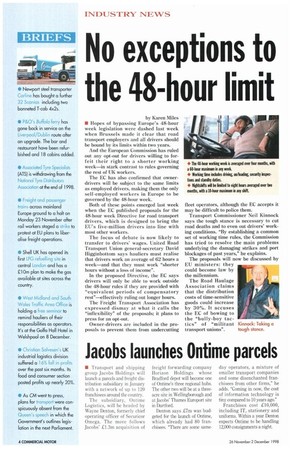No exceptions to the 48-hour limit
Page 6

If you've noticed an error in this article please click here to report it so we can fix it.
by Karen Miles • Hopes of bypassing Europe's 48-hour week legislation were dashed last week when Brussels made it clear that road transport employers and all drivers should he bound by its limits within two years.
And the European Commission has ruled out any opt-out for drivers willing to forfeit their right to a shorter working week—in stark contrast to rules governing the rest of UK workers.
The EC has also confirmed that ownerdrivers will be subject to the same limits as employed drivers, making them the only self-employed workers in Europe to be governed by the 48-hour week.
Both of these points emerged last week when the EC published proposals for the 48-hour week Directive for road transport drivers, which is designed to bring the EU's five-million drivers into line with most other workers.
The focus of debate is now likely to transfer to drivers' wages. United Road Transport Union general-secretary David Iligginbottom says hauliers must realise that drivers work an average of 62 hours a week—and that they must work "shorter hours without a loss of income".
In the proposed Directive, the EC says drivers will only be able to work outside the 48-hour rules if they are provided with "equivalent periods of compensatory rest"—effectively ruling out longer hours.
The Freight Transport Association has expressed dismay at what it calls the "inflexibility" of the proposals; it plans to press for an opt-out.
Owner-drivers are included in the proposals to prevent them from undercutting fleet operators, although the EC accepts it may be difficult to police them.
Transport Commissioner Neil Kinnock says the tough stance is necessary to cut road deaths and to even out drivers' working conditions. "By establishing a common set of working time rules, the Commission has tried to resolve the main problems underlying the damaging strikes and port blockages of past years," he explains.
The proposals will now be discussed by EU ministers: they could become law by the millennium.
The Road Haulage Association claims that the distribution costs of time-sensitive goods could increase by 30%. It accuses the EC of bowing to the "bully-boy tactics" of "militant Kinnock: Taking a transport unions", tough stance.
• The 4S-hour working week is averaged over four months, with a 60-hour maximum in any week.
• Working time includes driving, on/loading, security inspections and standby duties.
Nightshifts will be limited to eight hours averaged over two months, with a 10-hour maximum in any shift.




















































































































